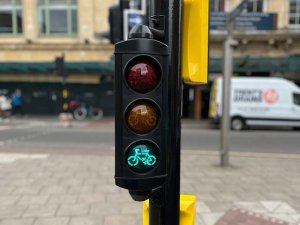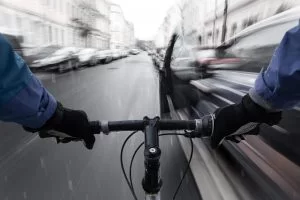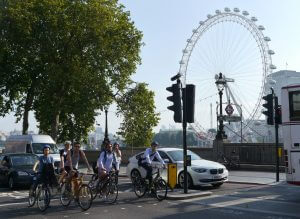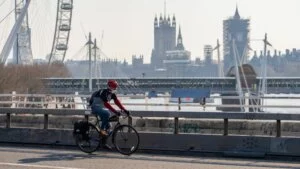How Dangerous is Cycling in London?
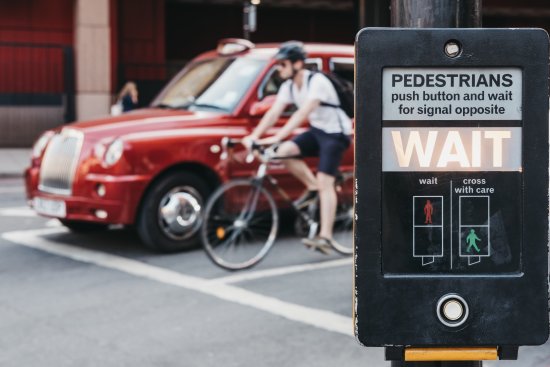
Contact
Table of Contents
Personal Anecdote
I acted for a client whose sensible reaction to the London Underground bombings of July 2005 was to get himself a bike and cycle to work. Within two weeks he was knocked off his bike by a lorry and suffered serious head injuries.
Is cycling in London safe?
Those of us cyclists-commuters who have been fortunate enough to escape serious injury will swear by our daily constitution, but are we brave or just foolish? A little context: there were 23,000 road traffic casualties in London last year. Cycling accounted for only 2% of all travel journeys but 9% of the casualties. However, this represented a 34% reduction in the numbers recorded for the period 1994 – 98 (TfL’s baseline average), despite a boom in cycling in the capital over the same period.
Health Benefits
And then there are the health benefits. I hesitate to claim fresh air as a positive benefit of London cycling, but cycling along the roads cannot be any worse than walking along them and statistically car drivers actually absorb higher levels of pollutants than either cyclists or pedestrians. Face masks are available but they are neither pretty nor comfortable and their filters must be replaced regularly to be effective. For many, they are a step too far.
The Mayor’s new low emissions zone may help clear the air a little for the cyclist. It won’t help those on the tube. It is no urban myth that breathing the air on a Northern Line tube train for 20 minutes draws the same mass of particulate matter past your lips as smoking a cigarette (although it’s only an estimate – Dr Ben Croxford, UCL, 2001).
In terms of the overall health dividend, there is little doubt that regular cycling boosts health and fitness and reduces the long-term risk of heart disease, obesity, diabetes and high blood pressure.
One calculation estimates that new cyclists travelling short distances reduce their risk of death (largely due to lower risk of heart disease) by 22%. The health benefits are said to exceed the risks by a factor of 20.
Cycle Accident Risks & Safety Measures
There are some cycle accident risks that are beyond a cyclists’s control: the bad driving of larger and more dangerous vehicles in particular, but knowledge and anticipation of particular dangers can save the cyclist from injury.
For instance, it is known that lorries in London account for a disproportionately high number of fatal accidents and serious injuries to cyclists (2/3 of all London cyclist fatalities involve a heavy goods vehicle). Lorries turning left at junctions are a particular danger for the cyclist, trapped at the nearside kerb. Staying behind that stationary lorry could just make all the difference.
- Read our case study: Cyclist pushing bike killed in Southall by HGV
By riding defensively and assuming other road users find you invisible, you may also avoid that car driver on his mobile turning right across your path or the white van driver parking and then opening his offside door as you cycle past. Refer to our blog on the changes to the highway code for the latest safety measures to protect cyclists.
Fit a bell to the handlebars (if the bike was first sold after May 2004 it was legally required to be fitted with one). It need not be a trilling St Trinians bell, just one that is loud enough to deter pedestrians from wandering out in front of you.
By law you must also have working lights to front and rear (and a rear reflector and yellow pedal reflectors, which should come with the bike). Flashing lights are more visible (and are now allowed since the law was amended in October 2005). Many lights are detachable and can be clipped to your helmet, rucksack or other appendange.
You can complement your flashing/steady red/white/yellow lights with some high-visibility clothing. It is not (yet) compulsory but most cycling kit now comes in loud colours and with reflective strips. It is easy to be conspicuous. Indeed at night it is hard not to look like a Christmas tree.
Another, more controversial, piece of safety gear is the cycling helmet. Figures published by the Department of Transport this week show that 60% of London cyclists wear them, which is double the national average. Are Londoners more careful, or is London more dangerous, or both? Cycling helmets are not compulsory, so why are we so keen on a piece of kit dismissed by Jeremy Clarkson as “a bunch of bananas”?
There is a body of opinion that claims the helmet has no proven safety benefits and that if made compulsory it would deter people from cycling. It is true that the scientific evidence is not overwhelming and that even its most ardent followers would accept that the cycle helmet offers only limited protection (it is at best a polystyrene shock absorber for certain non-vehicle impacts at 12 mph or less), but the evidence there concludes that the risk of brain and serious head injury is significantly reduced by their use. The British Medical Association is now amongst a growing number of bodies in favour of legislation to make cycle helmets mandatory.
Another point in favour of helmet use is that if one is unlucky enough to suffer a head injury following an accident on a bicycle the other party’s lawyers will almost always claim a 25% reduction in compensation for ‘contributory negligence’, if you were not wearing a helmet. Whether they will succeed is an entirely different matter and will depend on the facts of the case (and how good your lawyer is!), but the point is that there are not many good reasons to bike around London without a helmet on.
Conclusion
Cycling to work, like any physical activity, is not without risk of injury, but if I must commute I’d prefer it to be with the wind in my (helmeted) hair.
About the Author
Stuart Kightley is a Personal Injury Partner at Osbornes Solicitors in Camden, London. This article was published in North, Angel and North West magazines.
How we can help
For expert legal advice on cycling injury claims, contact Osbornes Solicitors today. Our experienced team can help you navigate the complexities of making a claim and ensure you receive the compensation you deserve.
To speak with one of our solicitors, contact us by:
- Filling in our online enquiry form; or
- Calling us on 020 7485 8811
Share this article
Make a cycling accident claim
Call us 020 7485 8811
Email us Send us an email and we’ll get back to you
Cycling News & InsightsVIEW ALL
- 12.12.2023
Guide to Bicycle Accident Settlement Amounts
Understanding bicycle accident compensation More people are taking their bikes in the UK, both as a form of exercise and...
Read more - 28.2.2023
Do you have to wear a bike helmet?
Should bike helmets be mandatory in the UK? Recently, Dan Walker was involved in a nasty collision with a motorist...
Read more - 5.5.2022
Top 10 Major Highway Code Changes for Cyclists
At the end of January 2022, the Highway Code was updated to make British roads safer for cyclists, horse riders and...
Read more - 20.1.2022
Knocked off your bike? What to do next
Now more than ever before, people are embracing the pleasures and benefits of cycling in and around London. Unsurprisingly, the...
Read more - 16.9.2021
The law around E-bikes and E-scooters explained
E-bikes and e-scooters are the new rides on the block. To many, they are the micro-mobility revolution that will deliver...
Read more - 31.12.2020
Bike Boxes – what are the rules?
Cycle boxes at traffic lights I read a post recently on a London cycling forum in relation to some confusion...
Read more - 11.5.2020
Can Cycle Helmet Camera Footage be used as...
Introduction to Bike Cams for Cyclists Have you ever been cut up by a van turning left? Or been riding...
Read more - 7.5.2020
Boom time for bikes – London Mayor’s new...
Transforming London’s Streets for Post-Lockdown Commute Yesterday Sadiq Khan unveiled his ‘London Streetspace’ programme designed to transform London’s...
Read more - 3.12.2019
Cycling accidents involving potholes
Cyclist Pothole Claims According to a recent article in the Telegraph there has been a 33% reduction in people cycling since...
Read more - 26.11.2019
Do I need insurance for cycling?
No legal requirement for cyclists to hold insurance There is no legal requirement for cyclists to hold insurance cover in...
Read more - 31.5.2019
New Laws to Tackle Intimidatory Driving & Cyclist Safety
The government is considering a new set of road safety laws aimed at protecting cyclists and other vulnerable road users....
Read more - 14.2.2019
Cyclists, Roundabouts and the Highway Code
The Highway Code is more than just a guide to how to pass your driving test. It is intended to...
Read more
The team offers specialist expertise in cycling-related injury claims and regularly acts for foreign nationals.
Stuart Kightley regularly handles cases involving brain injuries, fatal accidents, cycling collisions and workplace accidents.
The group is noted for its expertise in matters relating to cycling injuries, and is the official legal partner of the London Cycling Campaign charity.
"Offers specialist expertise in cycling-related injury claims."
"Osbornes often handles claims valued at over £1m, particularly relating to severe brain and spinal cord injuries and niche areas such as cauda equina syndrome and cycling accidents."





